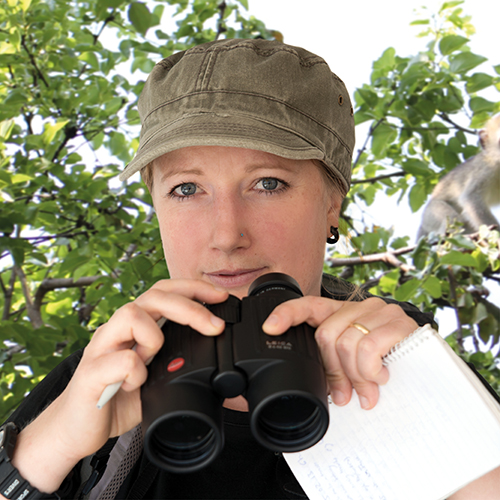
A social learning bias and intersexual dominance in vervet monkeys
22.06.2020 14:07
Two papers written by Branco Weiss Fellow Erica van de Waal have garnered attention in the public media recently. The first paper, published in Nature Communications, talks about how vervet monkeys copy higher-ranked individuals in a social transmission experiment. To learn more about how multiple social learning strategies interact and how organisms integrate both individual and social information, the scientists combined an open diffusion experiment with a modeling approach. The monkeys had access to eight foraging boxes that could be opened in either of two ways. While the animals socially learn the techniques by observing other monkeys, the researchers discovered evidence of a rank transmission bias favoring learning from higher-ranked individuals, with no evidence for age, sex or kin bias.
In the second paper, published in Frontiers in Psychology, van de Waal and her co-authors discuss the dynamics of intersexual dominance in wild vervet monkeys. Female mammals are usually considered to rank below males in the dominance hierarchy, because of their typical physical inferiority. Yet, in some groups or species, females are nonetheless dominant over some males. A theoretical model called “DomWorld” predicts that in groups with a higher proportion of males, females are dominant over more males when aggression is fierce. The researchers tested these predictions in four groups of wild vervet monkeys, using 7 years of data. Their findings confirm that a higher proportion of males in the group is associated with greater dominance of females over males, and that in groups with a higher fraction of males there is a relatively higher proportion of fights of males with other males, and proportion of fights won by females against males from the fights of females with any adults. Van de Waal and her colleagues conclude that female dominance relative to males is dynamic and that future empirical studies of inter-sexual dominance will benefit by considering the adult sex-ratio of groups
Read the news on Le Temps, Switzerland (in French)
Read the news on 20 minutes, Switzerland (in French)
Read the news on 24 heures, Switzerland (in French)
Read the article in Nature
Read the article in Frontiers in Psychology
